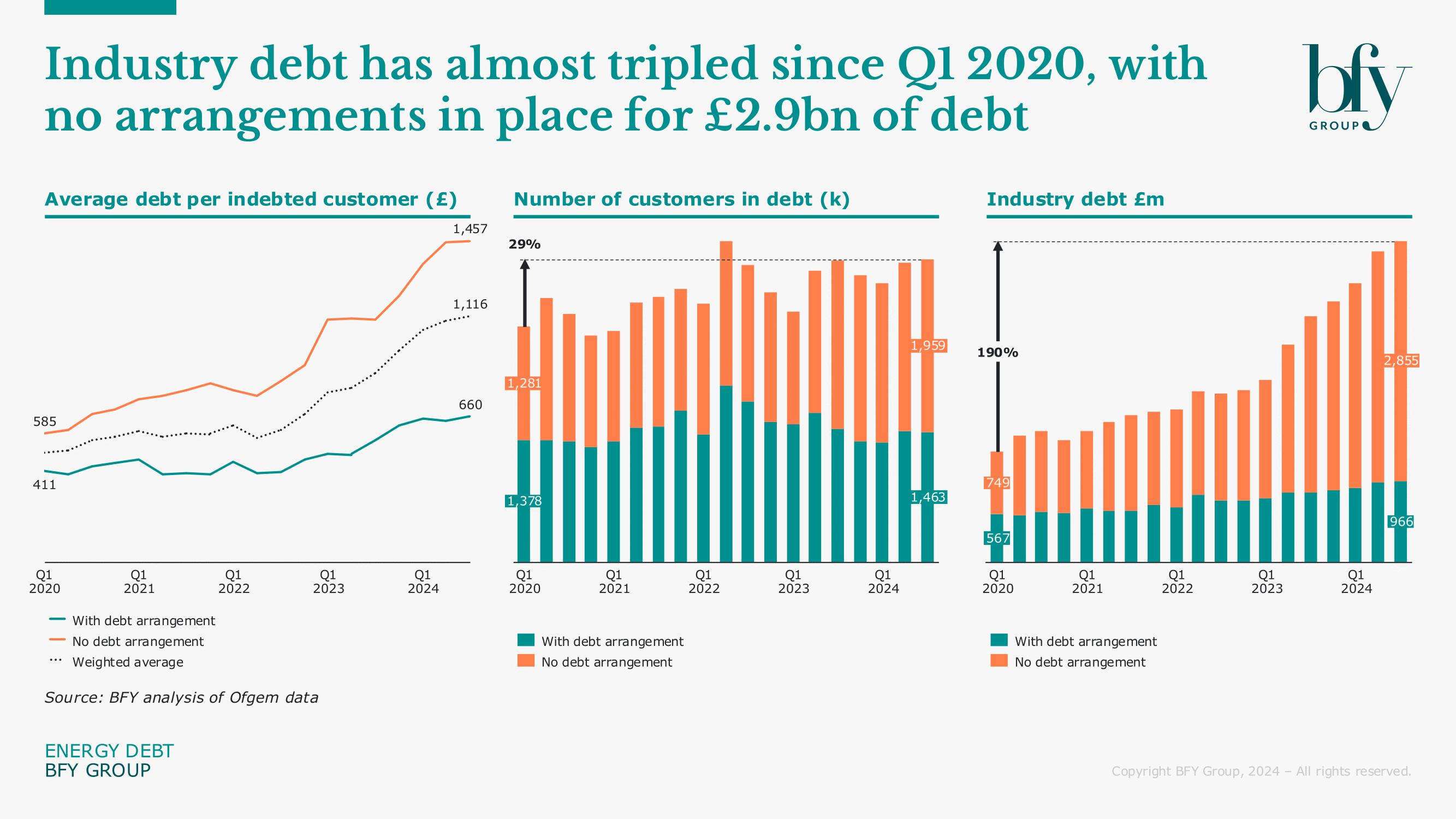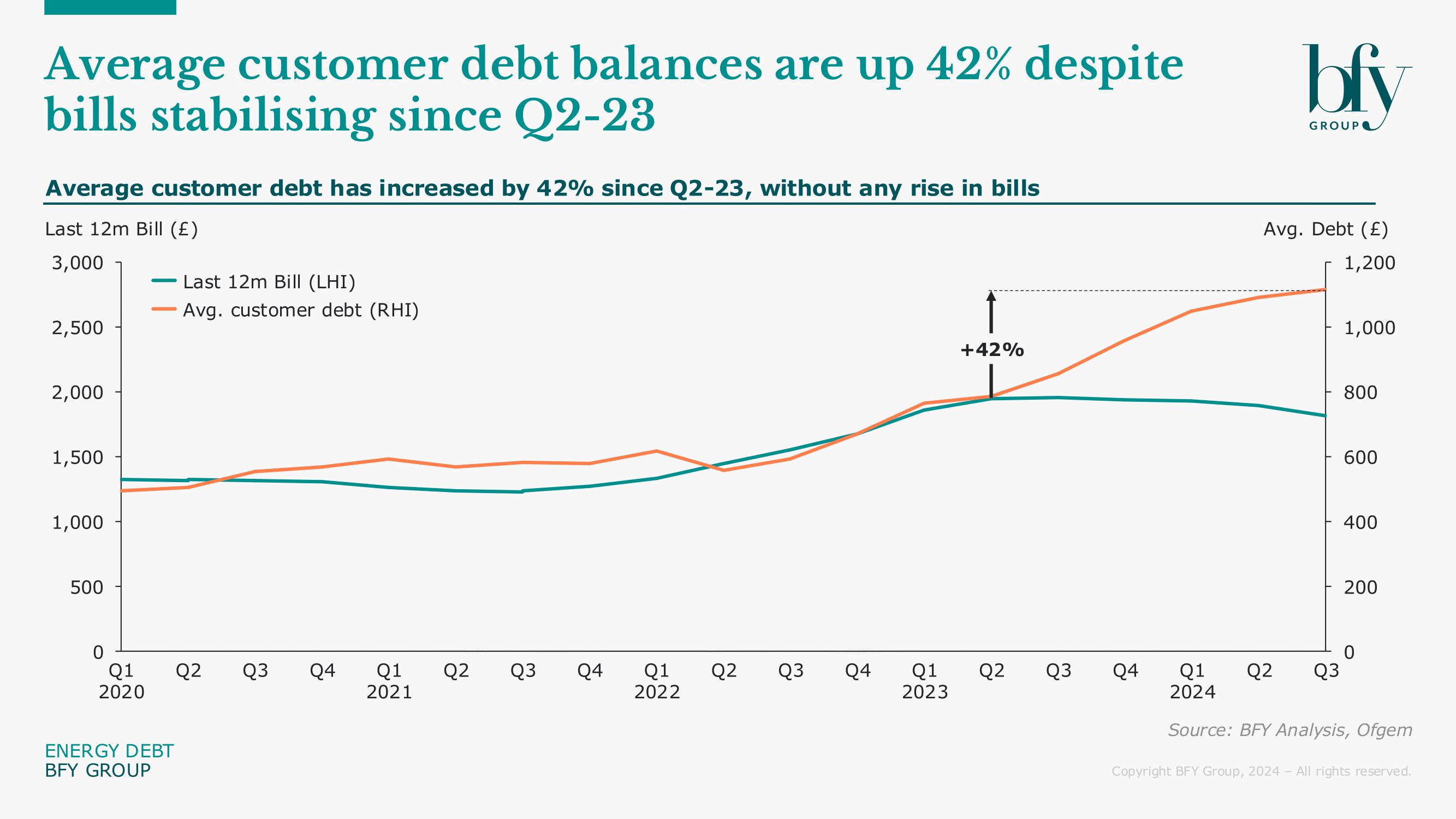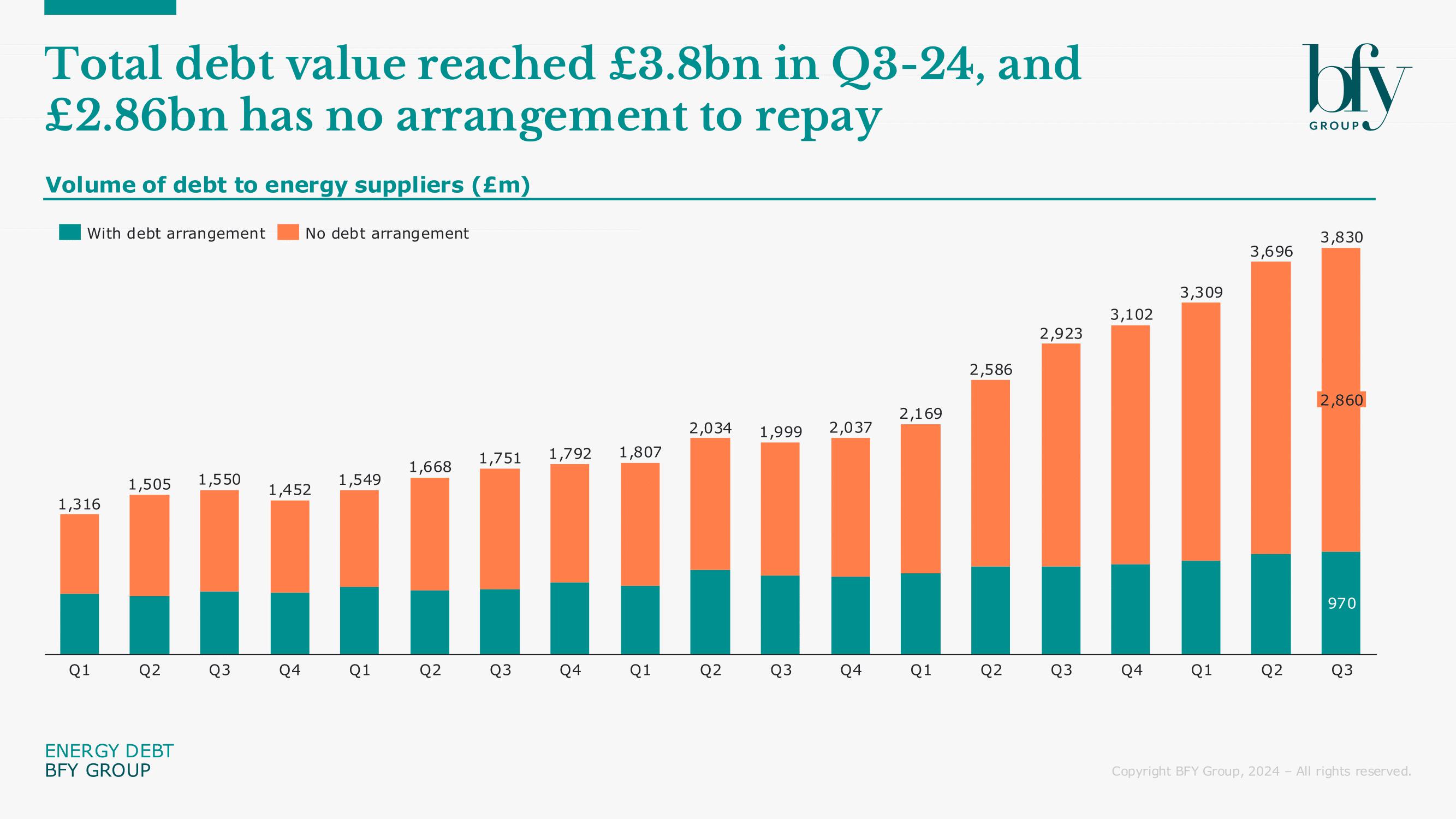Energy debt has reached a new high of £3.8bn as of Q3-24, up £134m from the previous quarter, and £0.9bn over the past year.
Alarmingly, £2.9bn (75%) of this debt remains without any repayment arrangement in place, with 2m customers in this bracket. Total debt has almost tripled since 2020, and the volume of customers without repayment arrangements is up 700k (55%) in the same period.
Ofgem’s proposed initiatives, including a debt relief scheme and a ‘Debt Guarantee’ to protect vulnerable customers, offer potential long-term solutions. However, the ongoing rise in debt points to a more persistent issue – affordability.
During the energy crisis, interventions helped keep costs down for many customers, but in their absence, bills have plateaued at relatively high levels. As a result, clearing the existing debt backlog could have limited impact unless broader affordability challenges are addressed.
A fundamental rethink on affordability is likely needed to tackle the root causes. This could involve expanding targeted support programmes, such as the Warm Home Discount, or introducing stricter price regulation for vulnerable customers, through social tariffs or tiered pricing. Greater investment in energy efficiency and renewables will also help customers reduce consumption, but as with all these potential solutions, significant collaboration, funding and policy alignment is required.

Average debt per account keeps rising, despite stabilising bills
Average debt per account has risen to a record £1,116, which marks a 42% increase since Q2-23, when bills first started to stabilise. While the latter is good news, it’s clear that households are still facing significant financial pressure.

£2.9bn (75%) of the industry’s debt has no payment plan in place
Despite efforts by suppliers to offer support, such as payment plans or tailored repayment options, 75% of the industry’s debt remains unmanaged.
Reasons for this may include:
- Affordability issues: Many households are unable to commit to repayment plans due to tight budgets and competing financial priorities
- Lack of engagement: Some customers may avoid communication with their supplier out of fear or embarrassment about their financial situation
- Insufficient awareness: Customers might not be aware of the support options available to them, leading to inaction
- Supplier challenges: Resource constraints and agent capability often hinder a supplier’s ability to maximise every customer interaction, preventing tailored solutions from being offered

How can suppliers continue to support customers?
Debt remains an immediate and significant issue for households, requiring ongoing support from energy suppliers. Investing in training and upskilling your front line advisors is especially key, as covered below.
Debt collection and prevention is not an area to underinvest in – suppliers who prioritise this area typically achieve a tenfold return on their investment.
Consider the following:
- Empowering your leaders: Are your leaders equipped with the tools for adapting to changing and challenging environments, as customers face unprecedented financial pressure? Are leaders coaching advisors to actively listen to customer needs and effectively handle objections?
- Investing in digital platforms: Are your platforms enabling customers to manage their payments and debt arrangements effectively? Self-service will be critical in helping customers to take control of their financial situations
- Engaging customers proactively: Are your collection cycles and communication channels fit for purpose? With fuel poverty now impacting a broader range of customer types, suppliers must develop diverse customer journeys. Extending collection cycles and leveraging multiple communication channels remains essential to keep customers informed and engaged
- Managing customers before debt collection: Are other issues, such as billing or metering errors, preventing your debt teams from focusing on customers in debt? Leading organisations are introducing customer management controls to understand the health of their portfolios and proactively remove barriers to payment. Ensuring bills are accurate, go out on time, and 100% right first time is key to ensuring debt collection activities can progress smoothly
We also continue to emphasise the importance of:
- Additional support and collaboration: Greater assistance is essential to help vulnerable households cope with rising debts, and collaboration across sectors is crucial to effectively identify those most in need
- Expanded customer service teams: As individual situations become more intricate, additional customer service representatives will be needed to thoroughly understand and address each case effectively
- Ongoing improvements to housing: The cost of delivering ECO and GBIS are continuing to increase as energy suppliers face higher costs to identify eligible customers and navigate administrative complexity
Ian Barker, Managing Partner at BFY Group, commented:
“The scale of energy debt, now at a record £3.8bn, highlights the immense financial strain on households and the critical challenges facing suppliers. Ofgem’s proposed measures, including the debt relief scheme and ‘Debt Guarantee,’ are welcome steps. However, the continued rise in debt shows an ongoing issue of affordability, which must be addressed to create lasting solutions.
"With £2.9bn of debt still without repayment arrangements, suppliers need to focus on providing immediate, tailored support while collaborating on sustainable solutions to reduce household financial pressures, and prevent further escalation of debt.”
For more on how you can better support customers throughout this challenging period, contact Rachel Littlewood.
Rachel Littlewood
Director
Rachel leads our operational and financial turnaround engagements, helping to solve complex operational challenges while maximising commercial performance and customer outcomes.
View Profile

